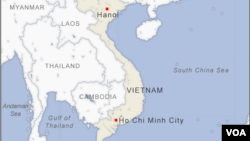A Hanoi court sentenced journalist and political activist Nguyen Vu Binh to seven years in prison on Tuesday, in a move critics described as a "brazen intimidation" of the media.
Binh, 55, has contributed to media outlets including TNT Media Live and VOA's sister network Radio Free Asia, or RFA. He covered issues including corruption, land rights, police abuse and human rights.
Authorities detained Binh in the capital, Hanoi, in February on accusations of spreading anti-state propaganda.
Binh denied the charge. He told the court that he did not call on anyone to act against the state and that he was only "exercising his right to freedom of speech," Binh's sister Nguyen Thi Phong told the AFP.
Media outlets and press freedom watchdogs have condemned Binh's sentencing. Radio Free Asia in a joint statement called the ruling "yet another example of Vietnam's unjust crackdown on free speech and brazen intimidation of journalists and writers."
Binh's case "warrants swift attention" from the international community, the statement said.
Advocacy organizations PEN International, the Vietnamese Abroad PEN Centre, and PEN America joined RFA in the statement. Binh is an honorary member of PEN International.
Patricia Gossman, associate Asia director of Human Rights Watch, told VOA that Binh's case is "the latest example of Vietnam's determination to silence dissenting voices."
"Vietnam's international donors and trade partners should take notice and denounce this continuing assault on human rights," Gossman told VOA via email.
In the past two months, seven other journalists and activists have been put on trial for allegedly criticizing their government, Gossman said.
This "crackdown on human rights defenders" has only intensified since former public security minister To Lam became president, Gossman added.
The Vietnamese Embassy in Washington did not respond to VOA's email requesting comment. However, a spokesperson for the Ministry of Foreign Affairs previously told VOA that Human Rights Watch "lacked objectivity," and that Hanoi convicts only those who violate the law.
Independent bloggers and journalists like Binh are the only source of media that is free from the state's single-party control, according to Reporters Without Borders or RSF. But they risk legal threats and arrest for independent or critical coverage. Vietnam is the world's third-largest jailer of journalists, according to RSF data.
Binh's reporting earned him two separate Hellman-Hammett grants, a prize that Human Rights Watch awards to writers who work under political persecution.
But his writing has also resulted in his persecution, according to watchdogs.
Imprisoned after letter
Binh was imprisoned from 2002–2007 on charges of espionage. His arrest came after he wrote a letter to the U.S. Congress about human rights violations in Vietnam, according to watchdogs. At the same time, he had published an article titled "On the Vietnam-China border issue," which criticized the government's border policy.
Data from the Committee to Protect Journalists, also known as the CPJ, shows that all but one of the 19 journalists detained in Vietnam as of late last year were held on "anti-state" charges.
Binh was "sentenced to seven years for airing independent views, which Vietnamese authorities continue to treat as a criminal offense," Shawn Crispin, CPJ's senior Southeast Asia representative, said in a statement. "Binh should be released now, along with all the other journalists wrongfully held behind bars in Vietnam."
Vietnam ranks 174 out of 180 countries on the World Press Freedom Index, where 1 shows the best media environment.





